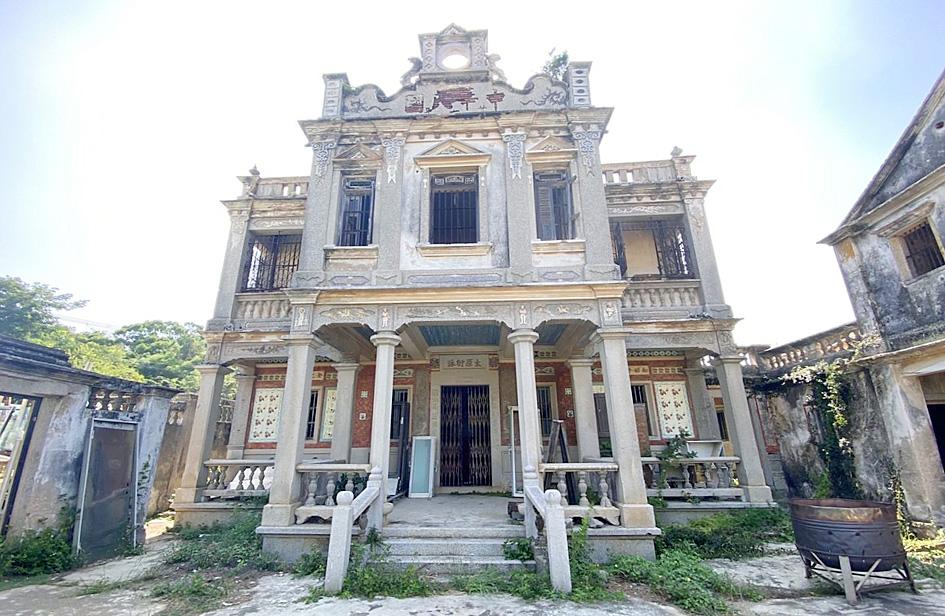Kinmen County on Wednesday began the restoration of a 92-year-old house and county-level cultural heritage site that county officials said would be turned into a hostel to boost the economy of Jinsha Township (金沙).
Kinmen County Commissioner Yang Cheng-wu (楊鎮浯) and the descendants of the family residence’s original owners attended the ceremony to mark the start of the restoration.
The Wang Chin-cheng’s Western House (王金城洋樓) combines Western and Hoklo architectural elements in an elaborate and graceful way, the county government said in a news release.

Photo: Wu Cheng-ting, Taipei Times
The county expects to complete the NT$40.2 million (US$1.44 million) restoration by the end of next year, it said.
Wang Chin-chen (王金城), a wealthy Kinmen native who lived in Indonesia, paid for the construction of the house, which began in 1918 or 1919, it said.
His brother, Wang Chin-so (王金鎖) supervised the construction and took up residence there upon its completion in 1932, it said, adding that Wang Chin-chen never lived in the house.
Later, Wang Chin-chen’s son, Wang Yun-chuan (王永傳), and his Indonesian wife briefly lived in the house, it said.
In 1937, the Imperial Japanese Army seized the house, which was not returned to Wang Chin-so until 1946, it said.
In 1954, the house was taken over by then-Republic of China Army 200th Division commander Han Cho-huan (韓卓環).
The news release cited Wang Chin-so’s granddaughter, Wang Yueh-mei (王月美), as saying that the takeover happened in the year she was born and that the family moved to three nearby houses that had also been built by her great uncle.
Wang Yueh-mei often visited the family’s erstwhile home with her father and still remembers that there was a bell on the house’s tower and that its gatehouse bore bullet marks from its two periods of military occupation, it said.
Han was twice commended for his garrison on Kinmen, and the house on both occasions hosted then-president Chiang Kai-shek (蔣中正) as a guest, she was cited as saying.
From 1956 to 1965, the house was used as a depot for engineering material, it said.
After that, a neighbor of the Indonesia-based members of the Wang family wired NT$30,000 to repair the house’s roof and outside walls, it said.
The house was recognized as a cultural heritage in 2015 for its rich history and the inherent artistic value of its architecture, the county government said.
The exterior features elaborate relief sculptures of soldiers, servants, angels and floral scrollwork, while the front of the house is adorned by earthenware totems in the Guangdong style, it said.
The walls of rooms on the ground floor feature alternating brick patterns that show exquisite artisanship, it said.
As banditry was rife in early 20th century Kinmen, numerous security features were incorporated into the architecture, including anti-burglary windows and fortified outer doors and doors to the staircase, it said.
Military slogans and the national flag were prominently displayed while the house was used by the army, it added.
The house is the only Western-style mansion in Kinmen with a classical Chinese landscape garden that has an artificial mountain and a pond, it said.

An essay competition jointly organized by a local writing society and a publisher affiliated with the Chinese Communist Party (CCP) might have contravened the Act Governing Relations Between the People of the Taiwan Area and the Mainland Area (臺灣地區與大陸地區人民關係條例), the Mainland Affairs Council (MAC) said on Thursday. “In this case, the partner organization is clearly an agency under the CCP’s Fujian Provincial Committee,” MAC Deputy Minister and spokesperson Liang Wen-chieh (梁文傑) said at a news briefing in Taipei. “It also involves bringing Taiwanese students to China with all-expenses-paid arrangements to attend award ceremonies and camps,” Liang said. Those two “characteristics” are typically sufficient

A magnitude 5.9 earthquake that struck about 33km off the coast of Hualien City was the "main shock" in a series of quakes in the area, with aftershocks expected over the next three days, the Central Weather Administration (CWA) said yesterday. Prior to the magnitude 5.9 quake shaking most of Taiwan at 6:53pm yesterday, six other earthquakes stronger than a magnitude of 4, starting with a magnitude 5.5 quake at 6:09pm, occurred in the area. CWA Seismological Center Director Wu Chien-fu (吳健富) confirmed that the quakes were all part of the same series and that the magnitude 5.5 temblor was

The brilliant blue waters, thick foliage and bucolic atmosphere on this seemingly idyllic archipelago deep in the Pacific Ocean belie the key role it now plays in a titanic geopolitical struggle. Palau is again on the front line as China, and the US and its allies prepare their forces in an intensifying contest for control over the Asia-Pacific region. The democratic nation of just 17,000 people hosts US-controlled airstrips and soon-to-be-completed radar installations that the US military describes as “critical” to monitoring vast swathes of water and airspace. It is also a key piece of the second island chain, a string of

The Central Weather Administration has issued a heat alert for southeastern Taiwan, warning of temperatures as high as 36°C today, while alerting some coastal areas of strong winds later in the day. Kaohsiung’s Neimen District (內門) and Pingtung County’s Neipu Township (內埔) are under an orange heat alert, which warns of temperatures as high as 36°C for three consecutive days, the CWA said, citing southwest winds. The heat would also extend to Tainan’s Nansi (楠西) and Yujing (玉井) districts, as well as Pingtung’s Gaoshu (高樹), Yanpu (鹽埔) and Majia (瑪家) townships, it said, forecasting highs of up to 36°C in those areas